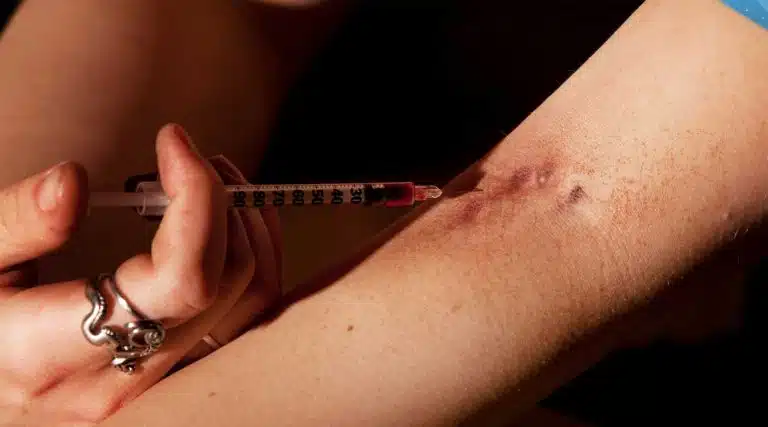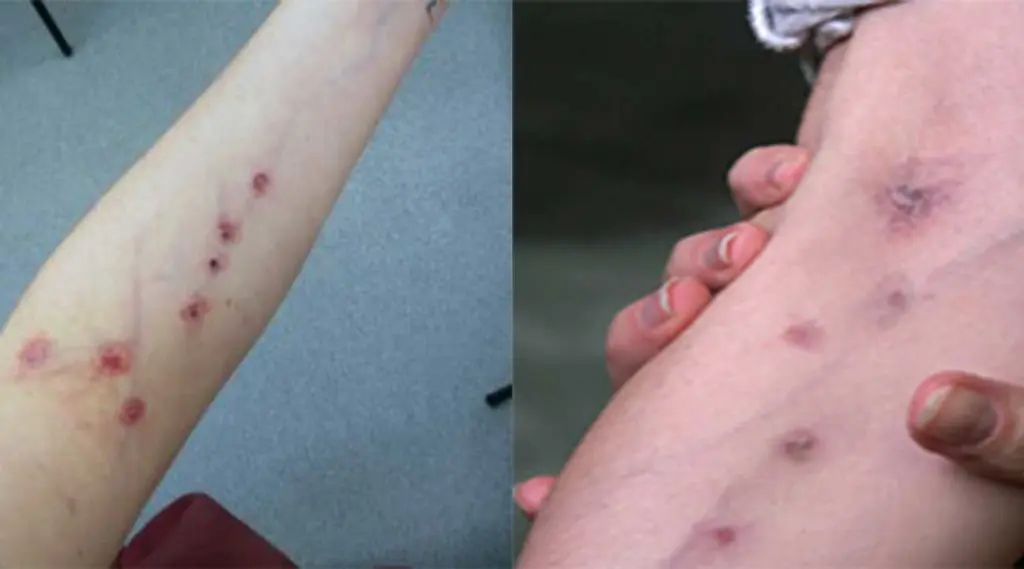Heroin Track Marks | How To Identify Heroin Track Marks
- Injecting Heroin
- What Are Track Marks?
- What Do Track Marks Look Like?
- Dangers Of Injecting Heroin
- Heroin Addiction Treatment

Many people who become addicted to prescription opioids eventually turn to heroin, a highly addictive illicit drug. Many people on heroin prefer injecting (“shooting up”) because of the rapid and intense onset of effects.
Intravenous drug abuse can cause scarring along the veins at the site of injection, also known as track marks. You may notice discoloration, bruising, scabbing, and puncture wounds near the site of injection.
If you recognize signs of track marks in a loved one, they may need treatment for heroin addiction or opiate abuse.
Injecting Heroin
Heroin is most commonly injected because the effects occur almost immediately compared to snorting or smoking. People addicted to heroin need a variety of paraphernalia to “cook” the drug and prepare it for injection.
Paraphernalia may include:
- spoon, where a mixture of powder and water are mixed
- lighter, used to dissolve the powder in the water
- cotton, used to filter out impurities
- needle, used for injection
- tourniquet, used to make veins more visible
Paraphernalia is just one of the signs associated with intravenous drug use. You may also notice visible track marks anywhere the drug is injected, which is a tell-tale sign of intravenous drug use.
What Are Track Marks?
Track marks are visible scars that appear on veins after trauma or injury from repetitive use. Many prefer to inject on the forearms, where veins are easiest to find. However, after long-term use scar tissue and inflammation can make it painful around the injection site and difficult to inject.
If this is the case, you may resort to injecting heroin into other areas of the body, such as the legs, hands, feet, or neck. Some of these areas can be dangerous to inject and may cause heart complications, collapsed veins, and blood clots.
What Do Heroin Track Marks Look Like
Track marks may vary in appearance and severity, depending on how often you inject and the condition of the needle being used. Using dull or old needles increases the risk of inflammation and scar tissue forming.
Signs of track marks include:
- bruising
- discoloration, such as darkened veins
- puncture wounds
- scabs
- linear scars along the veins

Those with heroin addiction are likely to either inject in places that are easy to hide or cover track marks with clothing, such as long sleeve shirts and pants.
Dangers Of Injecting Heroin
If an individual has signs of track marks, it is likely they are using heroin frequently. Chronic substance abuse can lead to serious health risks. When you inject, you are exposing your body to potentially harmful toxins and bacteria.
Health risks of IV heroin use include:
- abscesses, a swollen area containing a buildup of pus
- collapsed veins, vein is caved in and blocks blood flow
- bacterial infections, such as cellulitis
- viral infections, such as HIV and Hepatitis C
- wound botulism, a rare but potentially life-threatening toxin
According to the National Institute on Drug Abuse (NIDA), heroin contains additives that may be harmful when injected into the veins. They can clog blood vessels, which can cause permanent damage to several organs in your body.
Skin Pop Scars
Skin popping is a method of injecting heroin subcutaneously (under the skin). Repetitive injection under the skin can cause lesions, known as skin pop scars. These scars are often circular, indented, and may be lighter or darker than the surrounding skin.
Some people prefer this method of IV drug use because it is easier than finding a vein and heroin is absorbed more slowly. However, skin popping is a dangerous method that exposes your body to dangerous bacteria and irritants.
Heroin Addiction Treatment
Heroin addiction is a serious health concern in the United States. However, addiction is treatable with a supportive environment that targets your individual needs.
You may begin with detox and continue with medication-assisted treatment (MAT), which is effective at reducing cravings. Other treatment options may include long-term programs, such as behavioral therapy, inpatient rehab, or an outpatient program.
The most effective treatment plans will target both the physical and mental symptoms of addiction, giving you the best chance at long-term recovery.
If you’re seeking more information about addiction treatment options, please contact Ark Behavioral Health today.
Written by Ark Behavioral Health Editorial Team
©2024 Ark National Holdings, LLC. | All Rights Reserved.
This page does not provide medical advice.
Centers for Disease Control and Prevention - Injection Drug Use and Wound Botulism
National Institute on Drug Abuse - Heroin Drug Facts
National Library of Medicine - Impact of Injection Drug Use on Distribution and Severity of Chronic Venous Disorders
National Library of Medicine - Recognizing Skin Popping Scars: A Complication of Illicit Drug Use
Nevada Prevention Resource Center - Classifying Skin Lesions of Injection Drug Users

Questions About Treatment?
Ark Behavioral Health offers 100% confidential substance abuse assessment and treatment placement tailored to your individual needs. Achieve long-term recovery.
100% confidential. We respect your privacy.
Prefer Texting?
Our friendly support team is here to chat 24/7. Opt out any time.







 Learn More
Learn More








